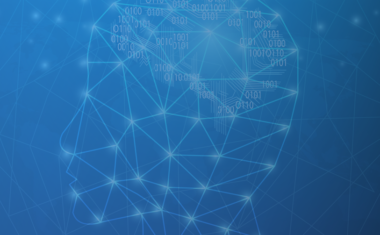There are a lot of misconceptions about artificial intelligence. Though AI is nothing like what you’ll see in science fiction films—robots definitely aren’t trying to enslave the human species—the idea of AI being intertwined with our daily lives can still seem a bit scary.
To help better understand how AI is (and isn’t) becoming a part of our daily lives, we’ve put together this guide. Below, we’ll tell you all about how AI is used across different industries, and highlight 14 real-world examples that illustrate AI’s growing omnipresence.
How Widely Used Is AI?
The global artificial intelligence market will surpass $1.5 trillion by 2030. From architecture and agriculture to tourism and transportation, AI has transformed several industries. In finance, for example, Bank of America has been using AI to improve its customer interactions since 2016. This is fairly typical of how AI is used today—AI can’t think as creatively as a human can, but it’s very effective at completing repetitive tasks.
Real-World Applications of AI
Let’s look at 14 real-world applications of AI:
Business
Here are some of the ways in which businesses are using AI today:
Automation
AI can’t replace human ingenuity, but it can do what it’s told. Alibaba, the online retail giant, is a prominent example of a company that has automated various tasks. It uses AI algorithms to:
- Study customer data
- Generate personalized recommendations for online shoppers based on this data
- Reduce manual anti-fraud verification delays by automating fraud detection
Decision-Making
Humans who run a business make thousands of decisions daily, but not all these decisions require unique thinking each time. The insurance company Allstate is a great example of how businesses are using AI and pattern recognition to make decisions more quickly. Its Drivewise tool can calculate the risk of insuring a given customer by analyzing their habits and the customer segment they’re part of.
Customer Sentiment Analysis
Another way that businesses are using AI today is by using natural language processing tools to analyze their customer feedback. The consulting firm Deloitte used such tools to help grocery chains in South Africa understand their customers’ most significant pain points by combing through over 1.5 million social media comments and interactions. By doing this, they were able to group different types of complaints, then see which sentiments prevailed within any one group.
Resume Screening
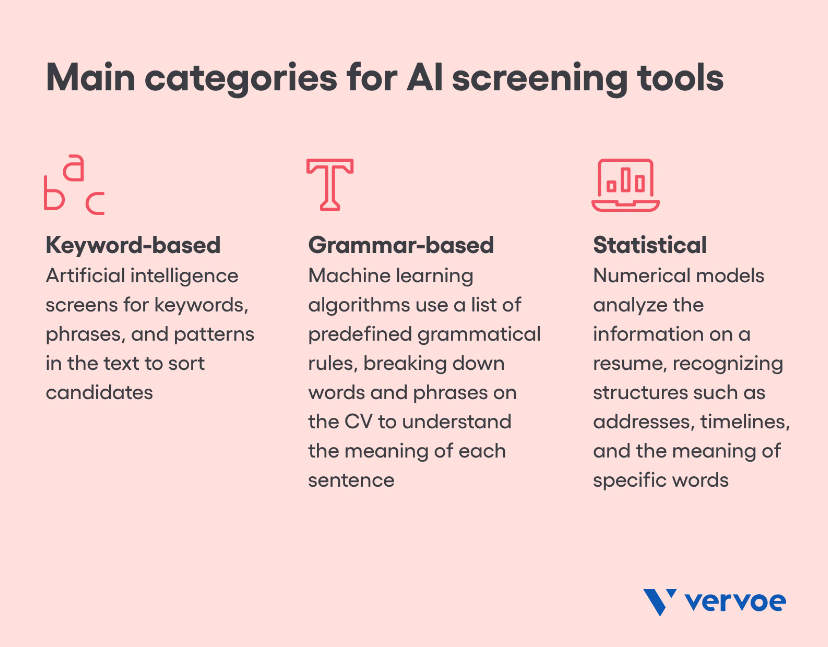
Artificial intelligence can help HR managers quickly comb through thousands of resumes by filtering out applicants who don’t have the right credentials listed on their resumes. Artificial intelligence can also help organize information about each candidate. Valiant Finance, an Australian fintech company, used this approach when it needed to quickly double its workforce.
Healthcare and Medicine
Hospitals use artificial intelligence in multiple ways to help doctors save lives. Some of these efforts include:
Disease Prediction and Detection
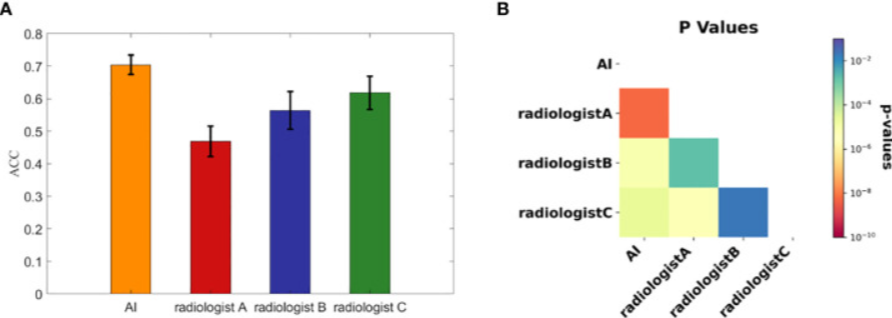
In an October 2022 medical study, a group of researchers evaluated the accuracy of an AI diagnosis system in detecting different kinds of thyroid lesions. They compared its performance to that of three radiologists. The AI system’s accuracy rate was higher than the best radiologist in the study, and could adequately assist them in differentiating between different thyroid lesions.
Medical Imaging
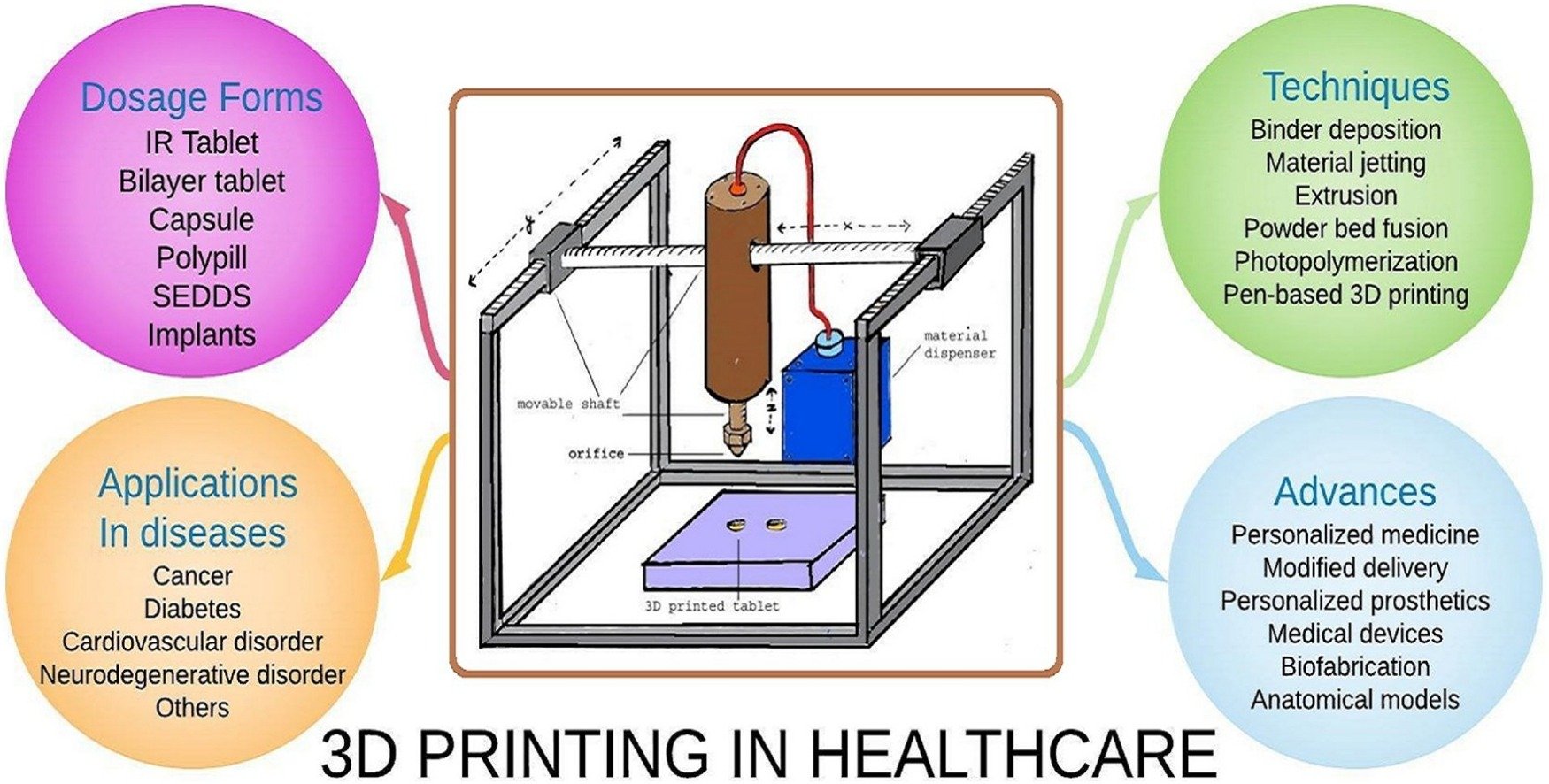
A well-trained artificial intelligence tool can detect complex patterns in imaging data. Royal Victoria Hospital in the UK has put this technology to use, with an AI-led 3D imagery and modeling tool that assists their surgical team. It identified bone fragments (which regular 2D imaging could not) in a patient who had suffered a motorcycle accident.
Streamlining Administrative Work
AI can also make medical administrative work more efficient. In 2018, Ochsner Health in New Orleans used AI scheduling for its anesthesiologists. It led to higher engagement levels among the anesthesiologists as they also got more monthly breaks for better work-life balance. During COVID, this AI tool helped efficiently allocate ICU shifts during higher patient influx.
Internet of Things (IoT)
Internet of things (IoT) is a fancy way of describing your network of smart devices and appliances. Let’s look at how IoT is employing AI today.
Voice Assistant Devices
You’re probably already familiar with Siri and other voice assistants. These assistants can’t answer complex questions, but they’re great at retrieving information quickly.
Home Security Systems
Everyone wants to feel safe in their home, but nobody wants a home security system that goes off every time they walk in the door. To strike the right balance, facial and speech recognition technologies can be used to recognize an actual intruder.
Facial Recognition

Amazon Astro, a moving robot security system, is a great example of this kind of facial recognition software in action, as it can distinguish between the faces of residents, routine visitors, and complete strangers. Using this data, it knows when to alert the owners of suspicious behavior.
Speech Recognition
Companies like Vector Security allow customers to connect their home security systems to virtual assistants. Customers can verbally instruct the system to perform routine tasks like locking doors and recording who is outside the door. The AI recognizes simple voice commands through virtual assistants to make home security more accessible.
Tourism and Hospitality
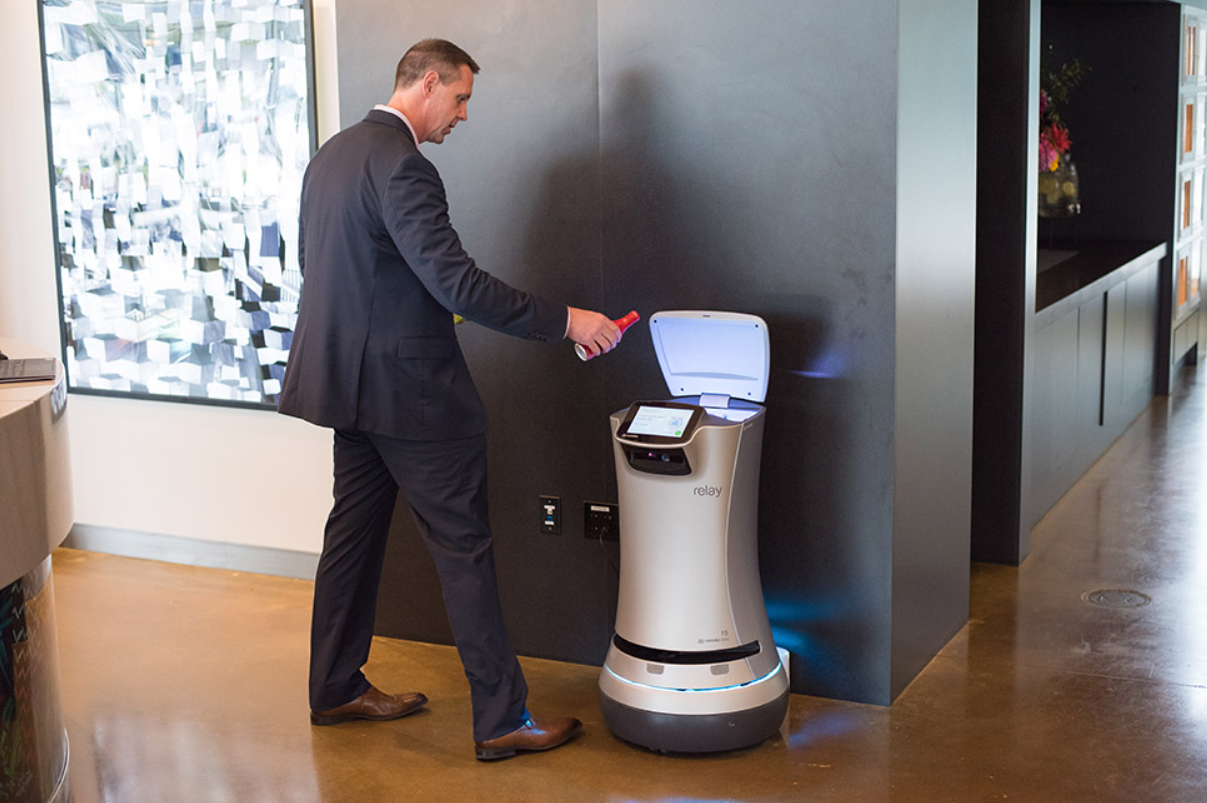
In tourism and hospitality, AI is being used to enhance customer experience, reduce administrative turnaround time, and increase revenue. For example, AI-powered robots like Botlr are being used to perform basic housekeeping tasks at Aloft hotels in California.
Architecture, Construction, and Real Estate

Now let’s look at industries requiring assistance with the design process, pricing, and productivity.
Generative Design
Project Dreamcatcher is a generative design system that solves design problems. The tool enables designers to meet their goals despite design constraints. Airbus has used it to generate designs that fulfill requirements related to passenger comfort, weight, etc., for airplane interiors.
Productivity Optimization
Katerra, a US-based construction and design firm, created Apollo, an AI-powered tool, to optimize productivity. Apollo analyzes construction data to make recommendations related to labor efficiency, material usage, and costs.
Price Forecasting
The real estate website Zillow uses AI for its in-house “Zestimate” tool, which analyzes real estate data to provide property valuations based on parameters like:
- Property size
- Location
- Number of rooms
- Past transactions related to the property
Marketing and Social Media

For both social media users and social media companies, AI is transforming the landscape:
AI Writing Tools
Many marketers are now experimenting with ChatGPT and other AI writing tools. Most consider it to be a good supplementary tool to help with content for marketing campaigns.
But the evolution of AI writing tools is not recent. Toutiao, a news syndication service, used an AI writing tool to cover the Rio Olympics on its site. It published over 400 articles throughout the event. The tool did so by going through the Olympics database and real-time results to generate short news pieces.
Targeted Advertising
AI is largely responsible for targeted advertising, as it combs through customer preferences and behavior to deliver tailored ads.
A/B Testing
A/B testing is necessary for businesses looking to track user engagement. One example of this is the Discovery channel, which used an A/B testing AI tool to increase engagement on its streaming platform. The tool ran experiments to track visitors and measured their customer experience, leading to increased video engagement.
Chatbots
Traditionally, chatbots use AI to answer standard customer queries such as order status, ticket generation, questions related to delivery, etc. But they can also do more. The cosmetics company Olay has a chatbot called Skin Advisor, which gives personalized skincare recommendations based on keywords the user inputs. Examples include “oily skin,” “serum,” “acne,” etc. The chatbot has helped customers form a doable skincare routine using the right products.
Social Media Feeds
Hong Kong Airlines is a great example of a company that uses social media feeds for lead generation, brand advocacy, and social selling. They do this with AI tools that sift through the social media behavior of their users to pinpoint what kind of content they are looking for.
Get To Know Other Data Science Students
Aaron Pujanandez
Dir. Of Data Science And Analytics at Deep Labs
Bret Marshall
Software Engineer at Growers Edge
Mengqin (Cassie) Gong
Data Scientist at Whatsapp
Energy
Machine learning tools can optimize the performance of solar panels and wind turbines by collecting data related to operating conditions. The company can then use this data to create strategies for more efficient maintenance. GE Renewable Energy, for example, uses an AI tool called Digital Wind Farm to ensure the efficiency and reliability of its turbines. The tool collects data to streamline predictive maintenance efforts.
Finance, Banking, and Insurance
Insurance and finance are both data-driven sectors, making them both ripe for AI innovations. Here’s what that looks like in practice:
Risk Assessment
Risk analysis is time-consuming because of how many different data points have to be considered. To circumvent this, Citi Group uses AI to assist with its risk identification process. The tool collects data, then scores the risk level associated with a particular user. Insurance companies use similar scoring tools to gauge the risk of providing insurance coverage to a specific individual.
Algorithmic Trading
With algorithmic trading, investors can buy or sell passively after setting a buying or selling point. Then, the stock is purchased when the criteria are met.
Agriculture
Here’s how artificial intelligence has helped bring agriculture into the 21st century:
Pest and Crop Disease Detection
Syngenta, an agri-chemical business that aims to improve global food security, uses AI to detect crop diseases. It does this by tracking pests in real-time. Their AI tool, AgriEdge Excelsior, uses sensors to collect and synthesize crop health data that can be used to make decisions.
Intelligent Irrigation Systems
Scott Miracle-Gro, a US-based garden machinery company, uses an AI tool called Hydrawise. As the name suggests, this tool helps optimize irrigation equipment for efficient crop irrigation. It uses sensors to create irrigation schedules by analyzing parameters like plant health, weather data, and soil composition.
Telecommunications

AI has rescued the telecom industry in numerous ways. Vodafone, for example, uses an AI tool to provide real-time assistance to customers using contact center technology. This has reduced their tech dispatch rate and improved customer satisfaction and first contact resolution rate.
Transportation
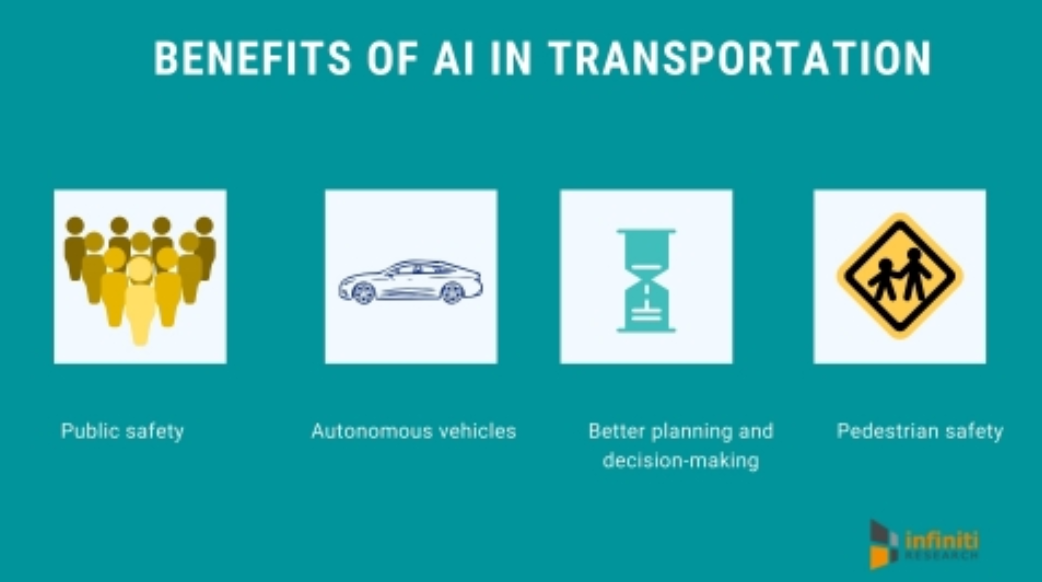
Here’s how AI has helped with safer roads and traffic management:
Self-Driving Cars
BMW has rolled out an electric sports vehicle that uses AI in different ways to support its self-driving features, including ultrasonic and radar sensors that promote self-steering, accelerating, braking, and sticking to lanes.
Google Maps
Google Maps uses deep learning algorithms to identify changes in roads by studying building edges and shapes. This happens based on outlines created by the operations team. They feed these images into the tool so that it “learns” how to identify building shapes.
Traffic Management
Google Maps also helps with traffic management by monitoring traffic conditions, predicting traffic patterns, and analyzing historical traffic data. The algorithms then suggest the best routes for users to take.
Media, Entertainment, Leisure, and Recreation

Here’s how AI is being used in media and entertainment today:
Personalized Recommendations
Netflix, Hulu, and other streaming providers track your viewing habits and searches to better suggest recommendations. Netflix takes this a step further by using AI to comb through all the frames of a movie or show to identify which frame is most likely to attract users. Netflix then uses that frame as the thumbnail.
Gaming
A recent example of AI in the gaming industry is the new video game God of War: Ragnarok. The game is designed with algorithms that dictate the gameplay based on user choices so that each player receives a unique experience.
Manufacturing
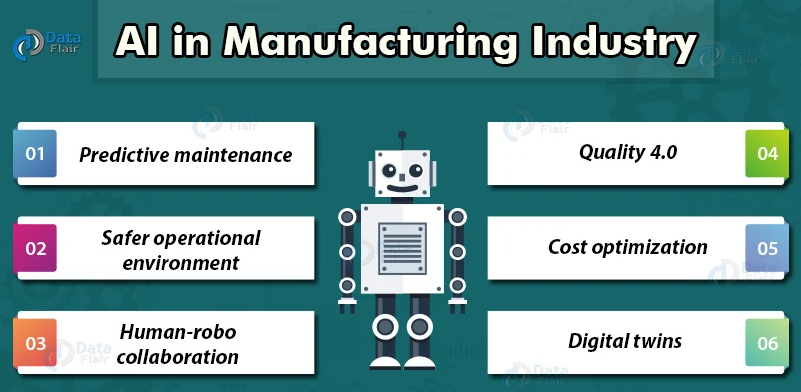
Here’s how the manufacturing sector uses AI today:
Supply Chain Optimization
AI tools can collect data on transport routes, available fleets, and pending orders, offering insights that help reduce traffic costs. DHL, for example, is a logistics provider that uses an AI platform called “Optimizer” to support warehouse management systems, organize transportation routes, and schedule delivery trucks.
Robotics
General Motors uses assembly line robots equipped with cameras, which can identify early signs of failure among components. This generates high-resolution images that can help spot problems and predicts outages.
Cybersecurity

AI has various uses in the cybersecurity industry, including breach risk prediction, endpoint protection, and threat detection and mitigation. Just in the same way that AI can be used to detect unusual behavior in your home, AI can also be used to detect unusual behavior in the cybersecurity realm too.
AI Applications FAQs
We’ve got the answers to your most frequently asked questions:
Which Industry Uses AI the Most?
According to AI researcher Bergur Thormundsson, the tech and telecommunications industries use AI most frequently. But other industries are quickly catching up.
What Are Some Unique Applications of AI?
Here’s one you probably didn’t expect: brushing your teeth! Oral-B has launched a “smart” toothbrush that studies and remembers the user’s brushing behavior and tweaks its settings according to brushing habits.
What Are Some Potential Applications for AI?
Nuclear waste disposal, space exploration, environmental monitoring, and natural disaster predictions are all on the AI horizon!
Companies are no longer just collecting data. They’re seeking to use it to outpace competitors, especially with the rise of AI and advanced analytics techniques. Between organizations and these techniques are the data scientists – the experts who crunch numbers and translate them into actionable strategies. The future, it seems, belongs to those who can decipher the story hidden within the data, making the role of data scientists more important than ever.
In this article, we’ll look at 13 careers in data science, analyzing the roles and responsibilities and how to land that specific job in the best way. Whether you’re more drawn out to the creative side or interested in the strategy planning part of data architecture, there’s a niche for you.
Is Data Science A Good Career?
Yes. Besides being a field that comes with competitive salaries, the demand for data scientists continues to increase as they have an enormous impact on their organizations. It’s an interdisciplinary field that keeps the work varied and interesting.
10 Data Science Careers To Consider
Whether you want to change careers or land your first job in the field, here are 13 of the most lucrative data science careers to consider.
Data Scientist
Data scientists represent the foundation of the data science department. At the core of their role is the ability to analyze and interpret complex digital data, such as usage statistics, sales figures, logistics, or market research – all depending on the field they operate in.
They combine their computer science, statistics, and mathematics expertise to process and model data, then interpret the outcomes to create actionable plans for companies.
General Requirements
A data scientist’s career starts with a solid mathematical foundation, whether it’s interpreting the results of an A/B test or optimizing a marketing campaign. Data scientists should have programming expertise (primarily in Python and R) and strong data manipulation skills.
Although a university degree is not always required beyond their on-the-job experience, data scientists need a bunch of data science courses and certifications that demonstrate their expertise and willingness to learn.
Average Salary
The average salary of a data scientist in the US is $156,363 per year.
Data Analyst
A data analyst explores the nitty-gritty of data to uncover patterns, trends, and insights that are not always immediately apparent. They collect, process, and perform statistical analysis on large datasets and translate numbers and data to inform business decisions.
A typical day in their life can involve using tools like Excel or SQL and more advanced reporting tools like Power BI or Tableau to create dashboards and reports or visualize data for stakeholders. With that in mind, they have a unique skill set that allows them to act as a bridge between an organization’s technical and business sides.
General Requirements
To become a data analyst, you should have basic programming skills and proficiency in several data analysis tools. A lot of data analysts turn to specialized courses or data science bootcamps to acquire these skills.
For example, Coursera offers courses like Google’s Data Analytics Professional Certificate or IBM’s Data Analyst Professional Certificate, which are well-regarded in the industry. A bachelor’s degree in fields like computer science, statistics, or economics is standard, but many data analysts also come from diverse backgrounds like business, finance, or even social sciences.
Average Salary
The average base salary of a data analyst is $76,892 per year.
Business Analyst
Business analysts often have an essential role in an organization, driving change and improvement. That’s because their main role is to understand business challenges and needs and translate them into solutions through data analysis, process improvement, or resource allocation.
A typical day as a business analyst involves conducting market analysis, assessing business processes, or developing strategies to address areas of improvement. They use a variety of tools and methodologies, like SWOT analysis, to evaluate business models and their integration with technology.
General Requirements
Business analysts often have related degrees, such as BAs in Business Administration, Computer Science, or IT. Some roles might require or favor a master’s degree, especially in more complex industries or corporate environments.
Employers also value a business analyst’s knowledge of project management principles like Agile or Scrum and the ability to think critically and make well-informed decisions.
Average Salary
A business analyst can earn an average of $84,435 per year.
Database Administrator
The role of a database administrator is multifaceted. Their responsibilities include managing an organization’s database servers and application tools.
A DBA manages, backs up, and secures the data, making sure the database is available to all the necessary users and is performing correctly. They are also responsible for setting up user accounts and regulating access to the database. DBAs need to stay updated with the latest trends in database management and seek ways to improve database performance and capacity. As such, they collaborate closely with IT and database programmers.
General Requirements
Becoming a database administrator typically requires a solid educational foundation, such as a BA degree in data science-related fields. Nonetheless, it’s not all about the degree because real-world skills matter a lot. Aspiring database administrators should learn database languages, with SQL being the key player. They should also get their hands dirty with popular database systems like Oracle and Microsoft SQL Server.
Average Salary
Database administrators earn an average salary of $77,391 annually.
Data Engineer
Successful data engineers construct and maintain the infrastructure that allows the data to flow seamlessly. Besides understanding data ecosystems on the day-to-day, they build and oversee the pipelines that gather data from various sources so as to make data more accessible for those who need to analyze it (e.g., data analysts).
General Requirements
Data engineering is a role that demands not just technical expertise in tools like SQL, Python, and Hadoop but also a creative problem-solving approach to tackle the complex challenges of managing massive amounts of data efficiently.
Usually, employers look for credentials like university degrees or advanced data science courses and bootcamps.
Average Salary
Data engineers earn a whooping average salary of $125,180 per year.
Database Architect
A database architect’s main responsibility involves designing the entire blueprint of a data management system, much like an architect who sketches the plan for a building. They lay down the groundwork for an efficient and scalable data infrastructure.
Their day-to-day work is a fascinating mix of big-picture thinking and intricate detail management. They decide how to store, consume, integrate, and manage data by different business systems.
General Requirements
If you’re aiming to excel as a database architect but don’t necessarily want to pursue a degree, you could start honing your technical skills. Become proficient in database systems like MySQL or Oracle, and learn data modeling tools like ERwin. Don’t forget programming languages – SQL, Python, or Java.
If you want to take it one step further, pursue a credential like the Certified Data Management Professional (CDMP) or the Data Science Bootcamp by Springboard.
Average Salary
Data architecture is a very lucrative career. A database architect can earn an average of $165,383 per year.
Machine Learning Engineer
A machine learning engineer experiments with various machine learning models and algorithms, fine-tuning them for specific tasks like image recognition, natural language processing, or predictive analytics. Machine learning engineers also collaborate closely with data scientists and analysts to understand the requirements and limitations of data and translate these insights into solutions.
General Requirements
As a rule of thumb, machine learning engineers must be proficient in programming languages like Python or Java, and be familiar with machine learning frameworks like TensorFlow or PyTorch. To successfully pursue this career, you can either choose to undergo a degree or enroll in courses and follow a self-study approach.
Average Salary
Depending heavily on the company’s size, machine learning engineers can earn between $125K and $187K per year, one of the highest-paying AI careers.
Quantitative Analyst
Qualitative analysts are essential for financial institutions, where they apply mathematical and statistical methods to analyze financial markets and assess risks. They are the brains behind complex models that predict market trends, evaluate investment strategies, and assist in making informed financial decisions.
They often deal with derivatives pricing, algorithmic trading, and risk management strategies, requiring a deep understanding of both finance and mathematics.
General Requirements
This data science role demands strong analytical skills, proficiency in mathematics and statistics, and a good grasp of financial theory. It always helps if you come from a finance-related background.
Average Salary
A quantitative analyst earns an average of $173,307 per year.
Data Mining Specialist
A data mining specialist uses their statistics and machine learning expertise to reveal patterns and insights that can solve problems. They swift through huge amounts of data, applying algorithms and data mining techniques to identify correlations and anomalies. In addition to these, data mining specialists are also essential for organizations to predict future trends and behaviors.
General Requirements
If you want to land a career in data mining, you should possess a degree or have a solid background in computer science, statistics, or a related field.
Average Salary
Data mining specialists earn $109,023 per year.
Data Visualisation Engineer
Data visualisation engineers specialize in transforming data into visually appealing graphical representations, much like a data storyteller. A big part of their day involves working with data analysts and business teams to understand the data’s context.
General Requirements
Data visualization engineers need a strong foundation in data analysis and be proficient in programming languages often used in data visualization, such as JavaScript, Python, or R. A valuable addition to their already-existing experience is a bit of expertise in design principles to allow them to create visualizations.
Average Salary
The average annual pay of a data visualization engineer is $103,031.
Resources To Find Data Science Jobs
The key to finding a good data science job is knowing where to look without procrastinating. To make sure you leverage the right platforms, read on.
Job Boards
When hunting for data science jobs, both niche job boards and general ones can be treasure troves of opportunity.
Niche boards are created specifically for data science and related fields, offering listings that cut through the noise of broader job markets. Meanwhile, general job boards can have hidden gems and opportunities.
Online Communities
Spend time on platforms like Slack, Discord, GitHub, or IndieHackers, as they are a space to share knowledge, collaborate on projects, and find job openings posted by community members.
Network And LinkedIn
Don’t forget about socials like LinkedIn or Twitter. The LinkedIn Jobs section, in particular, is a useful resource, offering a wide range of opportunities and the ability to directly reach out to hiring managers or apply for positions. Just make sure not to apply through the “Easy Apply” options, as you’ll be competing with thousands of applicants who bring nothing unique to the table.
FAQs about Data Science Careers
We answer your most frequently asked questions.
Do I Need A Degree For Data Science?
A degree is not a set-in-stone requirement to become a data scientist. It’s true many data scientists hold a BA’s or MA’s degree, but these just provide foundational knowledge. It’s up to you to pursue further education through courses or bootcamps or work on projects that enhance your expertise. What matters most is your ability to demonstrate proficiency in data science concepts and tools.
Does Data Science Need Coding?
Yes. Coding is essential for data manipulation and analysis, especially knowledge of programming languages like Python and R.
Is Data Science A Lot Of Math?
It depends on the career you want to pursue. Data science involves quite a lot of math, particularly in areas like statistics, probability, and linear algebra.
What Skills Do You Need To Land an Entry-Level Data Science Position?
To land an entry-level job in data science, you should be proficient in several areas. As mentioned above, knowledge of programming languages is essential, and you should also have a good understanding of statistical analysis and machine learning. Soft skills are equally valuable, so make sure you’re acing problem-solving, critical thinking, and effective communication.
Since you’re here…Are you interested in this career track? Investigate with our free guide to what a data professional actually does. When you’re ready to build a CV that will make hiring managers melt, join our Data Science Bootcamp which will help you land a job or your tuition back!







